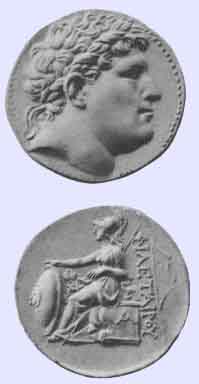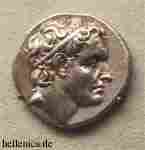.

Coin, dipicting the head of Philetaerus on the obverse and seated Athena, Greek goddess of war and wisdom, on the reverse, struck during the reign of Eumenes I (263 BC–241 BC)
Philetaerus (Philetairos) (circa 343 BC–263 BC) was the founder of the Attalid dynasty of Pergamon in Anatolia.
He was born in Tieum1 a small town on the Black Sea coast of Anatolia between Bithynia to the west and Paphlagonia to the east. His father was Attalus (perhaps from Macedonia) and his mother Boa was Paphlagonian.2
After the death of Alexander the Great in 323 BC, Philetaerus became embroiled in the struggle for supremacy, called the Wars of the Diadochi (diadochi means "successors" in Greek) between Alexander's regional governors, Antigonus in Phrygia, Lysimachus in Thrace and Seleucus in Babylonia (among others). Philetaerus served first under Antigonus. He then shifted his allegiance to Lysimachus, who, after Antigonas was killed at the Battle of Ipsus in 301 BC, made Philetaerus commander of Pergamon, where Lysimachus kept a treasury of nine thousand talents.3
Philetaerus served Lysimachus until 282 BC, when perhaps because of conflicts involving the court intrigues of Arsinoë, Lysimachus' third wife, Philataerus deserted Lysimachus, offering himself and the important fortress of Pergamon, along with its treasury to Seleceus4 who subsequently defeated and killed Lysimachus5 at the Battle of Corupedium in 281 BC. Seleceus himself was killed by Ptolemy Ceraunus a brother of Arsinoë at Lysimachia a few months later.6
Though nominally under Seleucid control, Philetaerus, especially after the death of Seleceus, had considerable autonomy and was able with the help of his considerable wealth to increase his power and influence beyond Pergamon. There are numerous records of Philetaerus as benefactor to neighboring cities and temples, including the temples at Delphi and Delos. He also contributed troops, money and food to the city of Cyzicus for defense against the invading Gauls. As a result Philetaerus gained prestige and goodwill for himself and his family.7
During his nearly forty year rule, he constructed on the acropolis of Pergamon, the temple of Demeter, and the temple of Athena, (Pergamon's patron deity), and Pergamon's first palace and he added considerably to the cities fortifications.8
Philetaerus never married and had no children.9 He adopted his nephew Eumenes I (the son of Philetaerus' brother also named Eumenes), who succeeded him as ruler of Pergamon, upon his death in 263 BC.10

Attalid Ruler
Succeeded by: Eumenes I
References
Hansen, Esther V. (1971). The Attalids of Pergamon. Ithaca, New York: Cornell University Press; London: Cornell University Press Ltd. ISBN 0801406153.
Junianus Justinus, Epitome of the Philippic History of Pompeius Trogus, translated, with Footnotes, by the Rev. John Selby Watson; London: Henry G. Bohn, York Street, Convent Garden (1853). (See: (http://www.forumromanum.org/literature/justin/english/introduction.html))
Pausanias, Description of Greece, Books I-II, (Loeb Classical Library) translated by W. H. S. Jones; Cambridge, Massachusetts: Harvard University Press; London, William Heinemann Ltd. (1918) ISBN 0674991044. (See: (http://www.perseus.tufts.edu/cgi-bin/ptext?lookup=Paus.+1.1.1))
Strabo, Geography, Books 10-12, (Loeb Classical Library) translated by Horace Leonard Jones; Cambridge, Massachusetts: Harvard University Press; London: William Heinemann, Ltd. (1924) ISBN 0674992334. (See: (http://www.perseus.tufts.edu/cgi-bin/ptext?lookup=Strab.+6.1.1))
Strabo, Geography, Books 13-14, (Loeb Classical Library) translated by Horace Leonard Jones; Cambridge, Massachusetts: Harvard University Press; London: William Heinemann, Ltd. (1924) ISBN 0674992466. (See: (http://www.perseus.tufts.edu/cgi-bin/ptext?lookup=Strab.+6.1.1))
Footnotes
1 Strabo, Geography, 12.3.8 (see: (http://www.perseus.tufts.edu/cgi-bin/ptext?lookup=Strab.+12.3.8))
2 Esther V. Hansen, The Attalids of Pergamon, (1971), p. 15.
3 Strabo, Geography, 13.4.1 (see: (http://www.perseus.tufts.edu/cgi-bin/ptext?lookup=Strab.+13.4.1))
4 Pausanias, Description of Greece, 1.10.3,4 (see: (http://www.perseus.tufts.edu/cgi-bin/ptext?lookup=Paus.+1.10.1)); Strabo, Geography, 13.4.1 (see: (http://www.perseus.tufts.edu/cgi-bin/ptext?lookup=Strab.+13.4.1))
5 Pausanias, Description of Greece, 1.10.5 (see: (http://www.perseus.tufts.edu/cgi-bin/ptext?lookup=Paus.+1.10.1))
6 Junianus Justinus, Epitome of the Philippic History of Pompeius Trogus, 17.2 (see: (http://www.forumromanum.org/literature/justin/english/trans17.html)); Strabo, Geography, 13.4.1 (see: (http://www.perseus.tufts.edu/cgi-bin/ptext?lookup=Strab.+13.4.1))
7 For a more detailed account of the benefactions of Philetaerus, including sources, see Esther V. Hansen, The Attalids of Pergamon, (1971), pp. 18–19; see also Strabo, Geography, 13.4.1 (see: (http://www.perseus.tufts.edu/cgi-bin/ptext?lookup=Strab.+13.4.1))
8 Esther V. Hansen, The Attalids of Pergamon, (1971), pp. 17,18
9 Both Strabo and Pausanias state that he was a eunuch, according to Strabo, as the result of a childhood accident; Strabo, Geography, 13.4.1 (see: (http://www.perseus.tufts.edu/cgi-bin/ptext?lookup=Strab.+13.4.1)); Pausanias, Description of Greece, 1.8.1 (see: (http://www.perseus.tufts.edu/cgi-bin/ptext?lookup=Paus.+1.8.1))
10 Strabo, Geography, 13.4.2 (see: (http://www.perseus.tufts.edu/cgi-bin/ptext?lookup=Strab.+13.4.2))
Greeks:
A - B - C - D - E - F - G - H - I - J - K - L - M -
N - O - P - Q - R - S - T - U - V - W - X - Y - Z
| Ancient Greece
Science, Technology , Medicine , Warfare, , Biographies , Life , Cities/Places/Maps , Arts , Literature , Philosophy ,Olympics, Mythology , History , Images Medieval Greece / Byzantine Empire Science, Technology, Arts, , Warfare , Literature, Biographies, Icons, History Modern Greece Cities, Islands, Regions, Fauna/Flora ,Biographies , History , Warfare, Science/Technology, Literature, Music , Arts , Film/Actors , Sport , Fashion --- |
Retrieved from "http://en.wikipedia.org"
All text is available under the terms of the GNU Free Documentation License

